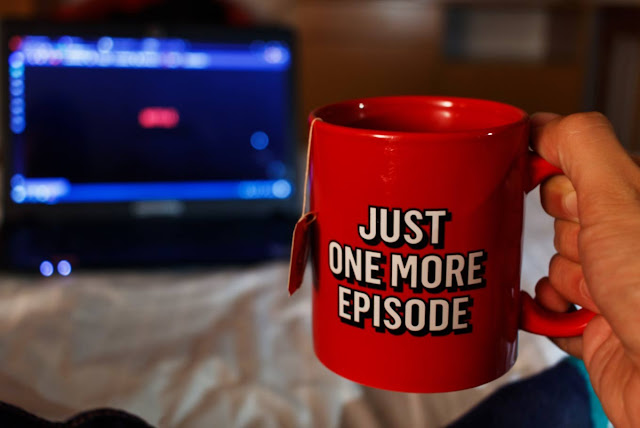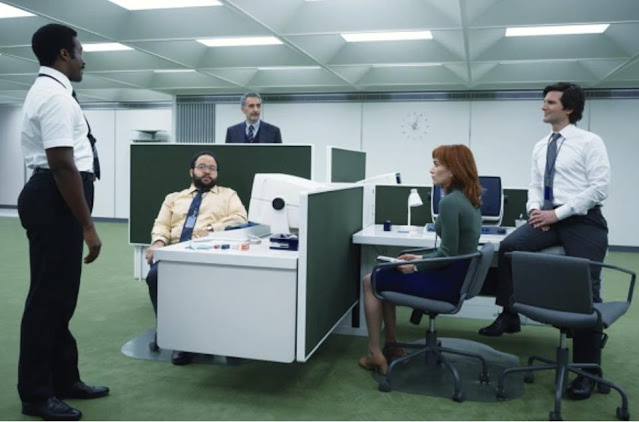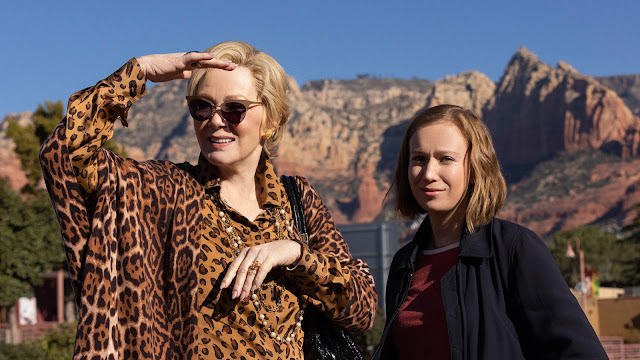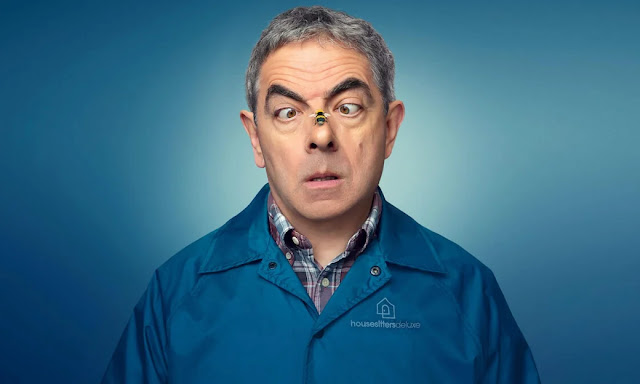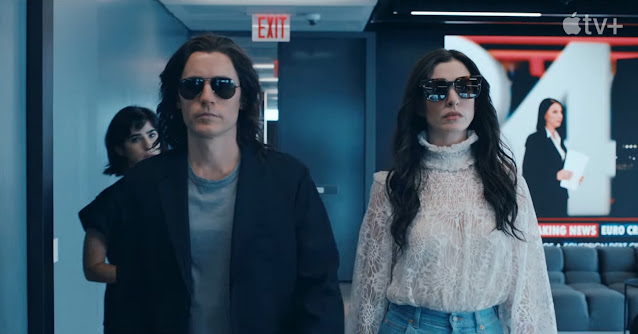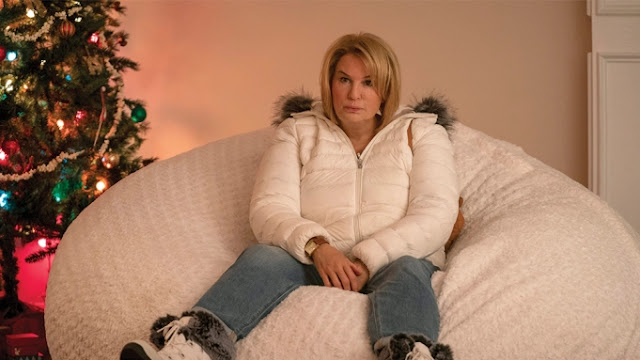We're just halfway through 2022, and I've already spent more time stretched out on my sofa, binging new streaming series, than I should probably admit. I haven't watched everything, by any means, but I've seen enough that I feel confident in passing on some recommendations.
It's going to be a long, hot summer. Here's what to watch - and what NOT to watch - when you're hiding out in the AC over the next couple of sweltering months.
Or you can do what I'm going to do and turn the TV off for most of the next two months! All these shows will be waiting for you on your streaming apps when the leaves start to fall and you're ready to stay in and curl up with a hot beverage.
(All thoughts here are COMPLETELY subjective, of course. As a blogger friend of years back used to say, "Your mileage may vary..)
THE BEST
A Very British Scandal (Amazon)
Not be confused with the earlier Amazon series, A Very English Scandal,. But, much like that darkly comic Hugh Grant series from a few years back, this is a true story of upper-class Brits behaving badly. Only this time, the tone is deadly serious, brittle and sad. Clare Foy and Paul Bettany play the very unhappily married Duchess and Duke of Argyll. The Duke is cruel and vicious; the Duchess seeks solace in the beds of other men. Their scandalous divorce proceedings, depicted in the final chapter, are a masterfully staged and acted pageant of hypocrisy and slut-shaming that, sadly, doesn't feel entirely removed from our own era. Foy and Bettany are electrifying in their roles, and the three-part series is an irresistibly easy binge, if not quite a feel-good experience.
Barry (HBO Max)
I've watched many, many black comedies, but Barry is simultaneously the blackest and the funniest of them all. Bill Hader's deeply conflicted Afghanistan-vet-turned-mob-hit-man-turned-actor continues to be the most radically complex character on television. Hader also writes the series, and directs some of its most accomplished episodes. There are two particularly brilliant set pieces from him this season. First, a delicious, deadpan scene in which Barry seeks help from a ridiculously cheerful customer service rep when the phone app he's using to detonate a bomb fails to get the job done. The second is a stunningly filmed motorcycle chase that comprises several shootings, but from which Barry emerges unscathed; it takes place in a single, breathtaking tracking shot.
The Dropout (Hulu)
Ozark (Netflix)
Somebody Somewhere (HBO Max)
The Staircase (HBO Max)
I came to The Staircase at a distinct advantage, having never watched the very popular Netflix docudrama on which it is based. Here the 'true crime' angle is muted, and the focus is on the complicated marital and family dynamics of the purported killer, his wife, and their large blended family of young adult children. Any time you've got a cast that includes Colin Firth, Toni Collette, Juliette Binoche, Michael Stuhlbarg and Parker Posey, you're more than halfway to a great viewing experience before you even start. And these actors do not disappoint. Assuming that you haven't seen the Netflix docudrama either, I'm going to let you go in go into this one with no more information. Going in cold is the best way to experience its unexpected twists and turns.
MIXED BLESSINGS.
Hacks (HBO Max)
In Season Two, the stand-up comedy act of Deborah Vance evolves and becomes more personal, but still never made me laugh. (A weakness this show shares with The Marvelous Mrs. Maisel; see below). But Jean Smart continues to deliver a beautifully modulated performance as the Joan Rivers-esque comedienne undergoing a personal transformation. There's more fine work as well from Hannah Einbinder, playing her much younger gag writer, Ava. The season opens with Deborah suing Ava for slander over an explosive email written when Ava was pissed off and over it. Over the course of eight episodes and many well-crafted two-hander scenes, they find rapprochement But the season is marred by the poor use of the usually delightful Laurie Metcalf as an eccentric tour bus driver and a whole subplot about the extremely annoying assistant to Deborah's manager. It's not without its pleasures, but it's a bit more uneven than Season One.
The Gilded Age (HBO Max)
Julian Fellowes, the creator of wildly popular Downton Abbey, now turns his focus to the socially prominent families of l9th century New York, just at the time when they're about to be invaded by the social climbing nouveau riche. It's a milieu well documented by novelist Edith Wharton in her day; I strongly prefer Wharton's take, but this show is not without its pleasures. Chief among them are the performances of Christine Ebersole as an old money doyenne, Cynthia Nixon as her sweet-tempered spinster sister, and Carrie Coon as the vulgar, newly rich lady across the street. A veritable plethora of Broadway musical stars pop in regularly in non-musical roles (Kelli O'Hara, Donna Murphy, Debra Monk and Nathan Lane, among others).
The weakest link, I'm sad to say, is Louisa Jacobson in the ingenue role. Much of the story revolves around her, but she's merely as sweet and bland as vanilla pudding - and frankly her character doesn't seem to be worth all the fuss.. I'm holding out hope for some complications in season two that will give Jacobson a chance to shine.
Julia (HBO Max)
I'm not sure why we we needed a six-part biographical series about Julia Child when Nora Ephron's beautiful 2008 film, Julie and Julia, told her story so well and so completely. As much I love Sara Lancashire in the title role and enjoy learning about the challenges of creating a cooking show, I'm equally troubled by the characters and situations that were invented out of thin air for this show. For starters, Julia Child never had a female producer on her show, let alone a black female producer whose presence in a story set in the early 1960s introduces a whole new set of entirely fictional complications. The notion of Child creating a cooking show out of menopausal sadness over never having children seems a bit far-fetched, too. Every biographical film or television series is tweaked here and there to heighten the drama, but Julia goes to lengths of speculation and invention that don't seem entirely conscionable.
Man vs. Bee (Netflix)
What if Mr. Bean was a sad sack single dad with a normal speaking voice? And what if a pesky, persistent bee invaded the high-tech mansion where he works as a housesitter? Ponder those questions and you'll get a good idea of what you're in for here. Rowan Atkinson remains, at 67, a master of physical comedy, and there are a lot of laugh-out-loud moments in the first half. But, thanks to unnecessary plot complications, the series runs out of gas well before its finale. (On a side note, I have NO idea why this was a series and not a movie; it's comprised of eight chapters, each of which clocks in at under 12 minutes, and each of which seamlessly segues, mid-scene, into the next.)
The Marvelous Mrs. Maisel (Amazon)
This series has repeatedly made a lot of noise about how much Midge Maisel will have to sacrifice to achieve stand-up comedy stardom. But we haven't actually seen her give up much. Despite being fired from Shy Baldwin's tour and reduced to making jokes between strippers' acts in a burlesque house, Midge still gets to live in a swanky Upper West Side apartment, wear cute clothes and generally make everything about herself. Enough already! I get that, in real life, it can take a performer many years to achieve their career goals. But we're four seasons into a five-season series, and our heroine doesn't seem to be anywhere near wised up. And her stand-up still really isn't that funny, although the audiences she plays to seem to eat it all up.
The best reason to watch this season? The continuing friendship - and tantalizing chemistry - between Rachel Brosnahan's Midge and Luke Kirby's Lenny Bruce. The final episode feels like one we've waited years for..
Under the Banner of Heaven (Hulu)
A true crime series about the investigation of murders committed by a Fundamentalist Mormon cult. Andrew Garfield gives a standout performance as the investigating detective who is himself a devout Mormon and whose faith is severely tested by what he finds. It's well made, but the finer points of Mormonism that are key to the developing plot are often difficult to comprehend, let alone follow. (Reading the recaps on Vulture, which are written by a ex-Mormon, will help.)
WeCrashed (Apple)
Yet another 'true scandal' drama, this one about the meteoric rise and spectacular fall of WeWork, a shared workspace concept that burned bright and fizzled fast thanks to the hubris and empty promises of its founder, Adam Neumann and his pretentious wife, Rebekah. Jared Leto, at his absolute Jared Leto-est, disappears entirely behind a thick Israeli accent and a constant stream of empty corporate-speak, while Anne Hathaway commits fully to Rebekah's narcissistic cluelessness. It's not that the story isn't compelling, nor that the series isn't competently made. It's that Leto and Hathaway inhabit their characters so completely that they wind up being as annoying and grating as the real people must have been; a little of them goes a lo-o-o-ong way. Had the story been compressed into three or four episodes instead of eight, this might have ended up in the "Best" category.
DISAPPOINTMENTS
Anatomy of a Scandal (Netflix)
Good actors (Sienna Miller, Rupert Friend, Michelle Dockery) wasted in a mildly engrossing courtroom drama with an absolutely preposterous, completely unbelievable 'big reveal' at the end. I won't spoil it, in case you're still curious enough to watch. But don't say I didn't warn you.
The Flight Attendant (HBO Max)
Why on earth was a second season of The Flight Attendant deemed necessary? The initial season was a well-crafted thriller with stylish and skillfully blended elements of suspense, comedy and pathos - and it was enjoyably complete in and of itself. In season two, the title character (Kaley Cuoco) has relocated to Los Angeles where she lives in a picture perfect bungalow and dates a nice, dependable guy while struggling to maintain her sobriety. AA requires her to perform community service as part of her program, so she works as a civilian 'volunteer' for the CIA. Really? Does that even make sense? The plot in this season is nearly incomprehensible. There's an entirely gratuitous and horrifying suicide scene along the way, and a lot of subplots that aren't particularly well integrated into the main story thread. The only reason to watch is for Sharon Stone's chilling appearance as Cassie's weary, long-estranged mother.
Gaslit (Starz)
Bob Woodward and Carl Bernstein recently appeared on the Stephen Colbert show to talk about Watergate. Bernstein recalled the day when Martha Mitchell called him up at the Washington Post to tell him that her husband, John (Nixon's attorney general) had left her and invited him to come over and go through her husband's diaries and papers. After consulting the Post legal department, he and Woodward did just that. They arrived to find Martha clutching a "birdbath-sized" martini and giving them access to a whole closet of Mitchell's papers. "We got some stories out of it," Bernstein recalled with a grin.
God, how I wish they'd put this incident in Gaslit.
This series promotes itself heavily on the performance of Julia Roberts as the maligned Mrs. Mitchell. Even the title is a reference to how she was treated by Nixon's henchmen when she dared to tell the truth about Watergate. And her performance is magnificent, as is Sean Penn's, playing John Mitchell under a shit ton of artfully applied latex and makeup.
But Martha's troubles are teased out in fits and starts, and only occasionally does she get to be the focus of the story. Far too much screen time is given to John and Maureen Dean (the former played by British actor Dan Stevens, affecting a just barely credible American accent.) Stevens is bland and annoying, and although Dean clearly had a pivotal role in the scandal, Gaslit gets really boring every time the focus is on him. Every time I was forced to watch the newlywed Deans making out, I found myself wondering what Martha was up to. (There's also a lot of sensationalistic hoo-hah about G. Gordon Liddy, who really was more than a little nuts. But those were just more scenes I wanted to fast- forward through to get back to the Mitchells.)
Like the recent Hulu series, Mrs. America, this series about a major political event of the 1970s is written and directed by people who weren't even born (or, at best, were toddlers) when it took place. And it shows. C_SPAN actually aired a far more engrossing docuseries on Watergate a few weeks later, in which the appearance of the real John Dean managed to be a highlight.
Ten Percent (Amazon. Sundance Now)
The Thing About Pam (Peacock)
The thing about Renee Zellweger is that she's in a fat suit for the first few episodes, and her latex jowls are so unconvincing (on my UHD television anyway) that she looks more like Fat Bastard from the Austin Powers movies than a murderous housewife with a taste for Cherry Coke Big Gulps. This is yet another true crime drama in which Zellweger portrays the sociopathic woman who murders her best friend and then just keeps getting into more trouble. I normally like Zellweger, but this is not a good role for her. Other good actors (among them, Judy Geer and Josh Duhamel) are wasted here, too.
